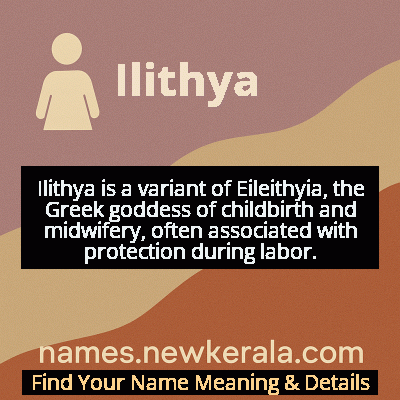Ilithya Name Meaning & Details
Origin, Popularity, Numerology Analysis & Name Meaning of Ilithya
Discover the origin, meaning, and cultural significance of the name ILITHYA. Delve into its historical roots and explore the lasting impact it has had on communities and traditions.
Name
Ilithya
Gender
Female
Origin
Greek
Lucky Number
3
Meaning of the Name - Ilithya
Ilithya is a variant of Eileithyia, the Greek goddess of childbirth and midwifery, often associated with protection during labor.
Ilithya - Complete Numerology Analysis
Your Numerology Number
Based on Pythagorean Numerology System
Ruling Planet
Jupiter
Positive Nature
Optimistic, inspirational, and creative.
Negative Traits
Scattered, exaggerating.
Lucky Colours
Yellow, gold, purple.
Lucky Days
Thursday.
Lucky Stones
Yellow sapphire.
Harmony Numbers
1, 2, 9.
Best Suited Professions
Arts, writing, communication.
What People Like About You
Creativity, optimism.
Famous People Named Ilithya
Ilithyia (Mythological)
Greek Goddess
Divine protector of women in labor, mentioned in Homer's Iliad
Ilithya Ravenna
Contemporary Artist
Mixed media artist known for feminist reinterpretations of mythological themes
Ilithya Jones
Academic Researcher
Published groundbreaking research on ancient Greek women's healthcare practices
Name Variations & International Equivalents
Click on blue names to explore their detailed meanings. Gray names with will be available soon.
Cultural & Historical Significance
Her importance is underscored by her appearances in major mythological texts, including Homer's Iliad where Hera mentions delaying the birth of Heracles by keeping Ilithya away. The goddess was often depicted holding torches, symbolizing her role in bringing children 'into the light,' or with her arms raised in the ancient gesture of epiphany. In some traditions, multiple Ilithyai were recognized, representing different aspects of childbirth. The transition of her worship to Roman culture as Lucina demonstrates her enduring significance across Mediterranean civilizations, maintaining her essential role in one of life's most fundamental experiences.
Extended Personality Analysis
Women named Ilithya are often perceived as nurturing, protective, and possessing strong maternal instincts. They tend to be natural caregivers who excel in supportive roles, whether in family settings or professional environments like healthcare and education. The mythological connection to childbirth lends an association with patience, endurance, and the ability to guide others through difficult transitions. Many Ilithyas demonstrate remarkable resilience and inner strength, capable of remaining calm under pressure while providing comfort to those in distress.
Their personality often combines practical wisdom with emotional intelligence, making them excellent mediators and problem-solvers in complex interpersonal situations. The name carries an expectation of reliability and trustworthiness, with bearers often becoming the 'rock' in their social circles. Interestingly, many Ilithyas report feeling a special connection to cycles of growth and transformation, whether in personal development, creative projects, or helping others through life changes. While they can be fiercely protective of those they care about, they typically express this through gentle guidance rather than overt control, embodying the mythological Ilithya's role as a facilitator rather than a director of natural processes.
Modern Usage & Popularity
Ilithya remains a rare but meaningful choice in contemporary naming practices, primarily selected by parents with an interest in classical mythology or seeking a unique name with profound feminine significance. While not ranking in the top 1000 names in most English-speaking countries, it has seen a slight uptick in usage following the popularity of mythological names like Athena and Luna. The name is particularly favored in academic and artistic circles, where its classical roots and connection to women's empowerment are appreciated. Modern bearers often report that while the name requires occasional explanation, it serves as an excellent conversation starter and creates a memorable impression. In recent years, the simplified spelling 'Ilithya' has become more common than the traditional 'Eileithyia' for practical everyday use. The name's rarity ensures that bearers stand out, while its positive associations with creation and nurturing make it an appealing choice for parents valuing both uniqueness and meaningful heritage.
Symbolic & Spiritual Meanings
Beyond its literal meaning as the goddess of childbirth, Ilithya symbolizes transformation, new beginnings, and the sacred power of creation. She represents the threshold between non-existence and life, making her name emblematic of major life transitions and creative endeavors. The mythological Ilithya could both hasten and delay birth, giving the name additional layers of meaning related to timing, patience, and the natural unfolding of processes. Symbolically, Ilithya connects to concepts of female wisdom, the mysteries of life and death, and the profound strength required to bring new things into being. In psychological terms, the name evokes Jungian archetypes of the nurturer and the wise woman, while in feminist interpretation, she represents female autonomy over reproductive experiences. The torch she carries in ancient depictions symbolizes not just physical birth but enlightenment and the emergence of consciousness, making the name relevant to intellectual and spiritual awakenings as well as physical creation.

